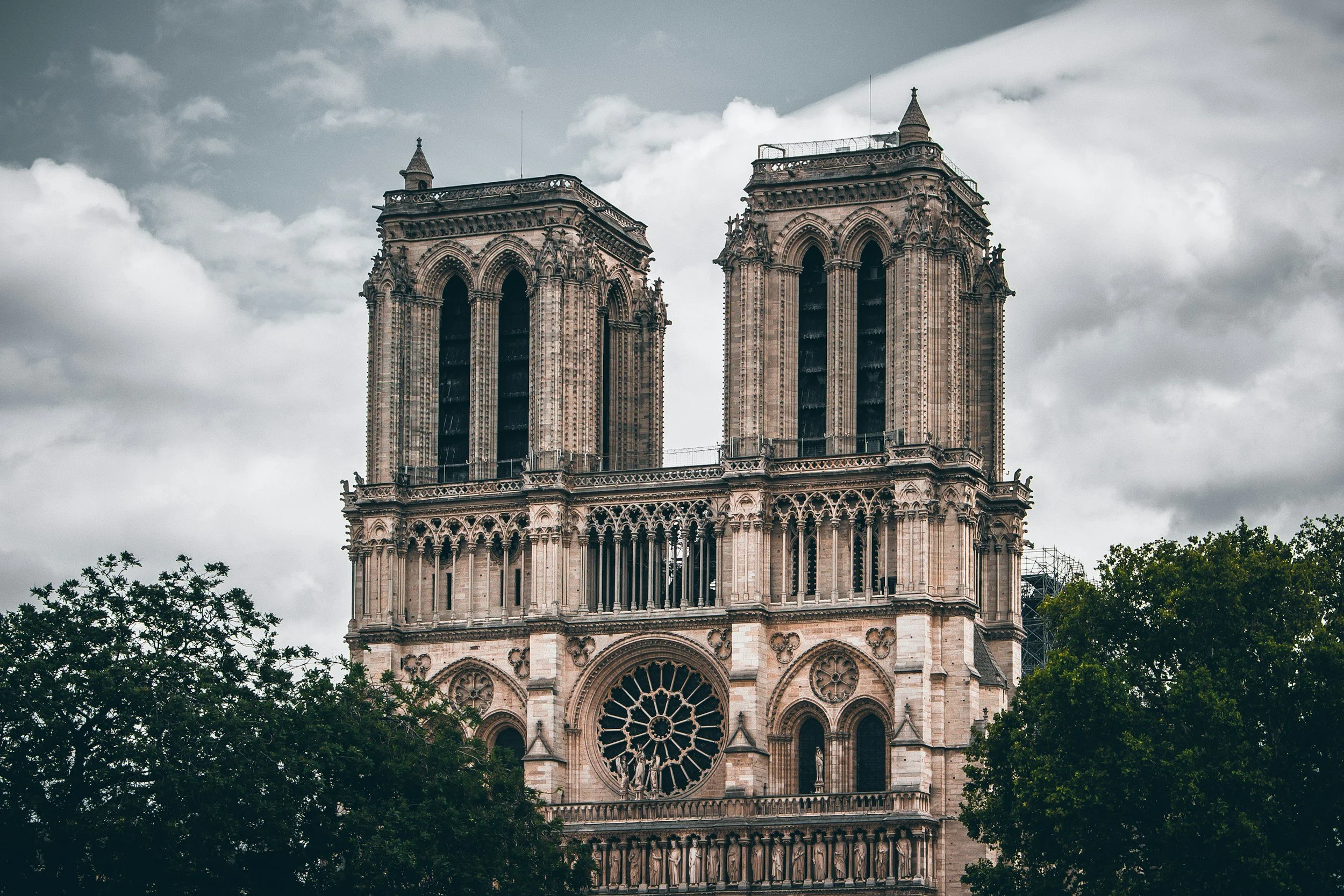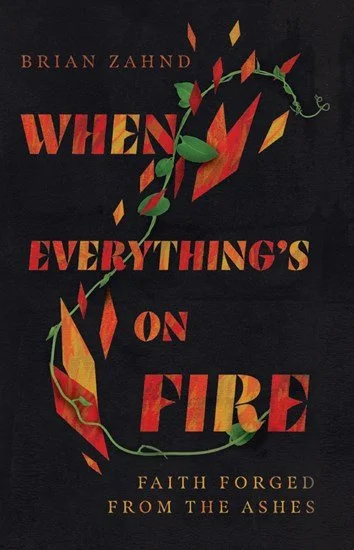When Everything Is On Fire
When Everything Is On Fire: Reconstructing Faith and Finding Truth Again
Adaptation from When Everything’s On Fire by Brian Zahnd
Adapted from Ch. 3, “The Day Derrida Died”
It was Monday of Holy Week 2019 and I had just finished leading a noontime prayer service when I heard the awful news that Notre Dame was on fire. Our Lady was on fire! I turned on the television and watched in horror for the next three hours. I hadn’t felt like this since 9/11. I wept. Millions of us did. The French news magazine Paris Match said, “Today, they weep for her in every language.”
Like millions of others, I watched in real time what seemed to be the agonizing death of a priceless treasure. For me, the most dreadful moment came when the 750-ton spire, already engulfed in flames, finally collapsed. It marked the moment when we all feared Notre Dame would be forever lost. “Notre-Dame had always seemed eternal, and the medieval builders certainly thought it would last until the Day of Judgment; but suddenly we
saw that it could be destroyed” (Ken Follett, Notre-Dame: A Short History of the Meaning of Cathedrals [New
York: Viking, 2019], 9). As I looked at Notre Dame on television, everything was on fire, and what hope for its salvation could there be now?
I suspect that many Parisians didn’t know how beloved their cathedral was until they saw it in flames, and I also suspect that many who think they are done with Christianity may not be as done as they suppose—at least not when they see Our Lady on fire. Most people have a deep-seated instinct that we don’t want to live in a world devoid of a community that is at least trying to preserve the beauty of Jesus. We may critique the church. Some may be done with the church. Others in their anger may shout “empty the pews!” But do we really think the world would be a better place without the story of Jesus? Do we really want to rid the world of the Beatitudes, the Sermon on the Mount, and the parable of the prodigal son? Do we really think that the world would be better off
without Christmas and Easter? Do we honestly think that our own lives will be better if we burn our Christian faith to the ground? This is not the kind of deconstruction that leads to a better world or a better life. Paris is not better without Notre Dame, and the world is not better without Christianity.
Thankfully, our worst fears were not realized. Notre Dame was not entirely lost; our Lady did not perish in those awful flames on Holy Monday, but it came close. The New York Times reported that the cathedral came within twenty minutes of being lost (Elian Peltier, et al., “Notre-Dame Came Far Closer to Collapsing Than People Knew,” New York Times, July 18, 2019, www.nytimes.com/interactive/2019/07/16/world/europe/notre-dame.html). Notre Dame was saved only because a team of firefighters volunteered to carry firehoses up the spiral staircases of the burning bell towers after another team had refused because of the danger. Through the heroic actions of firefighters who risked their lives for the beloved cathedral, the towers did not collapse, and Notre Dame was saved. It was severely damaged, but not forever lost.
One of the most iconic photos of the Notre Dame fire was taken from inside the cathedral the morning after the blaze. In the foreground, we see charred beams from the collapsed roof lying between the pew benches and the altar. On the high altar, we see a marble statue of the Virgin Mary holding the lifeless body of Christ after his crucifixion. Above the marble statue is a large golden cross that is reflecting the light and seems to stand triumphant above the wreckage. Behind the cross, the stained-glass windows at the east end of the cathedral are aglow with the sunrise. The photograph bears testimony to the reality of the catastrophe, but on the whole, it brims with hope. In the night everything was on fire, but in the dawn Our Lady still stands, the cross still shines, and
rays of hope still illuminate a sacred place.
What can we do when everything is on fire? Perhaps we can recognize that not all structures of belief are the same. Some deserve to be condemned, some need to be deconstructed, and some are not worth saving. But other structures of belief are worth risking everything to try to save them. Yu’s faith got a second chance when he visited Notre Dame on the day that Derrida died. A cathedral that can do something like that is worth saving, and the world is grateful to those firefighters who risked their lives to do so. If a cathedral inspired by and built to the glory
of the Christian faith is worth saving, how much more is the faith itself worth saving?
If you’re going through a time of deconstruction, maybe it’s worth trying to save that which is precious before you let it all burn down. Maybe it’s worth trying to separate the wheat from the chaff before you launch into a world without any more Easters. Deconstruction doesn’t have to mean demolition. I’m convinced that the beautiful cathedral of Christian faith that has stood for two millennia and has helped flood the world with the message of Jesus is worth trying to save. Renovate what needs to be renovated, throw out what needs to be thrown out, deconstruct what needs to be deconstructed, and even let some of it burn, but don’t burn it all down. The cathedral of Christian faith, Our Lady, who has nurtured and carried the gospel message of Jesus Christ, is worth our best efforts to save. Seeing the Cathedral of Notre Dame on a spring day while strolling along the Left Bank in Paris reminds me that Christian faith can still enact a beautiful presence in our world.
Adapted from When Everything's On Fire by Brian Zahnd. ©2021 by Briand Zahnd. Used by permission of InterVarsity Press. www.ivpress.com.
Bio: Brian Zahnd is the founder and lead pastor of Word of Life Church in St. Joseph, Missouri. Known for his theologically informed preaching and his embrace of the deep and long history of the church, Zahnd is a frequent speaker at conferences, universities, and seminaries around the world. As a pastor-theologian, he is the author of numerous titles, including The Wood Between the Worlds, When Everything's on Fire, Sinners in the Hands of a Loving God, A Farewell to Mars, and Beauty Will Save the World.
Link to Brian’s website: https://brianzahnd.com/
The views expressed in this blog are those of the author and do not necessarily reflect those of the Jude 3 Project. Content is for informational purposes only. Some posts may feature guest contributors. To inquire about writing for Jude 3, contact us at blog@jude3project.com.


